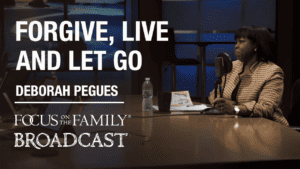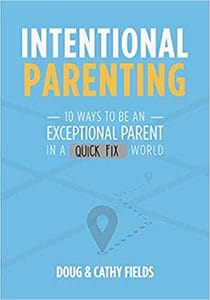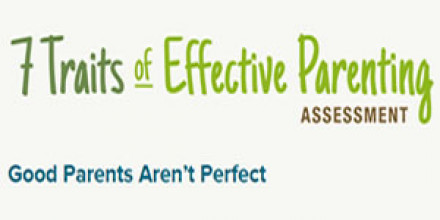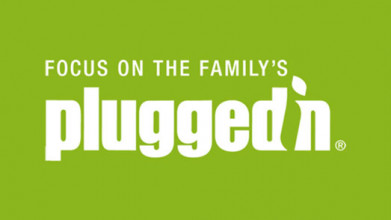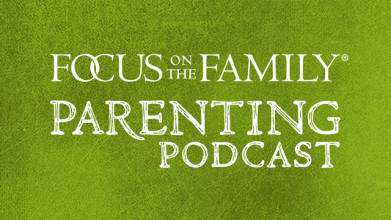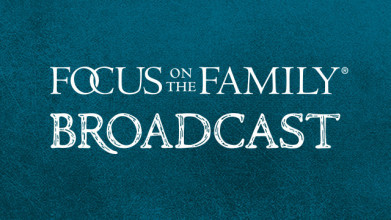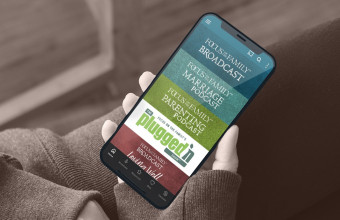Doug Fields: Some of your kids are gonna strike out and experience strikeouts in life. All of them will. And they’re also gonna experience home runs in life, and what they need to hear from the most important people in their life is, “I love you and I believe in you.”
John Fuller: We’ve got a big dose of encouragement for you as a mom or a dad on today’s program with Focus on the Family president Jim Daly, and I’m John Fuller.
Jim Daly: Well, I think it’s safe to say that we all want to be the best mom or dad we can be, and today we have a great message to share on intentional parenting from Doug Fields. After spending 30 years as a youth pastor in Southern California, Doug really knows kids, especially teenagers, and today and next time we’re going to hear some excellent parenting strategies that I know you’ll want to embrace.
John: Fortunately, Doug shares that wisdom with a great sense of humor and energy, and he’s really fun to listen to.
Jim: It’s true, John, and Doug Fields is a teaching pastor at Mariners Church in Irvine, California, and that’s where this message was recorded about a year before he joined their teaching team.
John: Here now is Doug Fields on Focus on the Family.
Doug: Always, always so fun to be here. I was here a couple weeks ago when we kicked off the relationship series. To have me two times in one month just shows that Mariners de- is desperate right now.
Audience: (laughs).
Doug: So, um, but I’m thrilled, thrilled to be here. Hey, raise your hand if you’re a parent. Yay. Yeah, most parents that I’ve talked to would say that this whole idea of parenting is, is difficult, and every parent has a degree of regret. If you’re a single parent you’ve taken the word difficult and replaced it with impossible. And if you are a single parent, you are one of my heroes in life, honestly. I don’t know how you’re doing it. The only people in here that are happy as parents are called empty nesters, okay?
Audience: (laughs).
Doug: And I know, you see them. They’re, they smile, they clap. They’re very, they tithe more. It’s really incredible, all right? And, and the really angry people are people called boomerang parents. And boomerang parents are parents who thought they were empty nesters, but their kids came back to live with them.
Audience: (laughs).
Doug: So regardless of where you are in your journey, raise your hand if you’re not a parent at all. Let me see. Yeah. And some of you will be, some of you won’t, ’cause you don’t like kids.
Audience: (laughs).
Doug: You don’t want to be around them, you don’t want to think about them. You’re already on your phone googling other, other sermons to listen to, you know?
Audience: (laughs).
Doug: I, I get it. You’re actually the people that I like to sit next to in restaurants when, when my kids were little, okay-
Audience: (laughs).
Doug: … because your looks of condemnation are priceless. The rolling of the eyes, like, “I would, if I was a parent I would never allow my child to do that”, you know. I love sitting next to you. As a matter of fact, one, one time when my kids were little the Fields family of five walked into a restaurant and the lady (laughs) asked to be moved to another booth. And so I asked if we could be moved next to her.
Audience: (laughs).
Doug: Because that’s what pastors do, they help you grow, all right, so.
Audience: (laughs).
Doug: Here’s the deal. We’re in part five of this series called The Art of Relationships, and we’re picking up today, we’re talking about the parent-child relationship, but if you’re not a parent, it still applies to you. Because unless you are a hermit, your life is going to intersect with kids. You’re an aunt, you’re an uncle, you’re a grandparent, you’re a coach, you’re a teacher, you’re a mentor, you’re a neighbor, you’re a human that’s going to intersect with, with young people, and this is important for you. Now, I just need to say I’m not an expert at raising kids, okay? I used to be. (laughs). And then we had kids, okay?
Audience: (laughs).
Doug: And then when they became teenagers, I actually became the dumbest human on the planet, all right?
Audience: (laughs).
Doug: But now that they’re all in their 20s, two of them are married off to wonderful people, I have actually been deemed kind of cool. So those of you who are the dumbest, you have that to look forward to. It’s, it’s in your future. And honestly, I wish Cathy, my wife, was the one that was teaching today, because she’s the real expert, but she would actually rather die than stand on this stage and speak. But I tell people if, if parenting were high school, she’d have been the valedictorian and I’d have been the guy in the cafeteria trying to burp the alphabet, okay?
Audience: (laughs).
Doug: That’s the difference. So everything I’m teaching you, I’ve stolen it, okay, I’ve stolen it from the Bible, and from heavy observation of, of my wife. So to win in relationships, let’s start here. To win in your parent-child relationship or caring adult to child relationship, you have to have what I call strong belief, all right? And strong belief is, this is where it starts. And this is not you believing in your kids, “Oh, sweetheart, you’re the, you’re the best singer in the world. You have a great voi-.” Yeah, that’s great, believe in your kids. But what I’m talking about here is the strong belief in your role as a parent. Parents, if you don’t believe that you have the single strongest influence in the life of your child, you have, you have trouble coming your way. And by the way, it doesn’t matter how old you are. You know, I talked to some people last night in the patio afterwards and they were like, “Well, this is too late for me. My kids are in their 20s and 30.” It’s never too late. Please hear that. I have friends who are in their 40s and 50s, and you know what they grieve? They grieve that they’re not getting anything from their parents. Our kids want us to be their heroes. They really do. They won’t tell you that, okay, but they’ll tell me that. I find it in, in research. I saw it in Instagram this week. I love this. Look at this, little kid writes a letter. “Dear Mom, thank you so much for being my mom. If I had a different mom I would punch her in the face and go find you.”
Audience: (laughs).
Doug: “Love, Brooke.” Don’t you love that? Parents, kids want you to be their hero. And caring for kids, this is actually a big deal to God. Look, let’s look at the Scriptures. In Mark chapter 9, Jesus took a little child with him, took a little child and had him stand among them. Taking the child in His arms, Jesus said to them, “Whoever welcomes one of these little children in My name welcomes Me, and whoever welcomes Me does not welcome Me, but the one who sent Me.” So Jesus is saying is that when you welcome a child, you welcome Him. I mean, this is a big deal. This is a high calling. This puts parenting in a whole new stratosphere. Some you parents, you may need to understand, maybe one of the most spiritual things you can do is to invest in your kids and to be a parent. It’s your life purpose, it’s part of your, your, your destiny. So if you are a parent, here’s what I want you to do. I want you to raise your right hand and repeat after me. Let’s do it. Ready? Repeat after me. I’m a big deal.
Audience: I’m a big deal.
Doug: Yes, you are, okay? Now, start acting like you’re a big deal. And again, to those of you who are older, you’re a big deal to your kids still. The day both of my parents died I wanted more from them as a grown man. And so when you are a big deal and you have this strong belief, what some of us in here need to do is we need to begin to put the value of parenting above the value of our paycheck. So when people ask you what you do, don’t refer to your career. Some people say on a plane or whatever, people go, “So, what do you do?” I go, (laughs) “That’s easy. I’m in, I’m in charge of socializing three homo sapiens in the dominant values of the Judeo-Christian tradition in order that they might become instruments in the social transformation of the social order that God prescribed.”
Audience: (laughs).
Doug: And then I say, “And what do you do?”
Audience: (laughs).
Doug: “I’m just a lawyer.” Okay. So once you, once you have the strong belief, okay, you got the strong belief, that’s part one, and then what you’ve got to do is you’ve got to add it to the reality that kids today are growing up in a different world. It is not the same world that you and I grew up in. How many of you would agree with that? It’s a different world today, absolutely. You know, when Grandma said log on, she was cold, right?
Audience: (laughs).
Doug: And so it’s a whole different world. So the world has changed, but kids, in and um of themselves, have not changed that much. Look at this quote. “Youth today love luxury. They have bad manners, contempt for authority, no respect for older people, and they talk nonsense when they should be working.” Sounds like today, right?
Audience: Yeah.
Doug: You know who the author of this quote is?
Audience: No.
Doug: Socrates.
Audience: (laughs).
Doug: 500 years before Christ. Meaning kids have been driving adults crazy for thousands of years, all right? There is nothing new. Kids today are still asking the same fundamental questions that, that you asked. Who am I? Does anyone really like me? Am I okay? And, can I get an allowance for not doing anything?
Audience: (laughs).
Doug: Okay, you know, these are the, the common questions that kids are asking relating to identity and meaning and purpose. And here’s what I want you to see, so important we put it on the screen. The best way to understand kids is not to learn how different kids are today, but for you to have a good memory. See, if you could actually remember what you felt like when you were in third grade or fifth grade or seventh grade or ninth grade or going into college or graduat- you remember the feelings relating to that, you’re actually going to parent and grandparent and coach and mentor and teach in different ways. Because if you just take on, if you’re just cursing the culture that kids are living in now like it’s their fault that they’re living in this culture, you’re always going to be mad.
John: Well, that’s Doug Fields on today’s episode of Focus on the Family, and you can get the book that Doug wrote with his wife, Cathy, it’s called Intentional Parenting: 10 Ways to be an Exceptional Parent in a Quick Fix World. We’ve got that available here at the ministry, and, uh, we’re making that available when you contribute to the work of Focus on the Family, a monthly pledge or one-time gift of any amount. Also, when you get the book from us we’ll include a free audio download of the entire presentation. Donate today and request those resources at focusonthefamily.com/broadcast, or call 1-800, the letter A, and the word FAMILY. Let’s return now to more of this presentation from Doug Fields.
Doug: So, you know, parents are always getting hung up about appearance, and, you know, I don’t like the way that she dresses or what he does with his hair, you know, all these types of things, but just remember how important appearance was to you, okay? Appearance mattered to me. Does anybody remember the ’70s when maroon was really popular, okay?
Audience: (laughs).
Doug: Yeah. Yeah, appearance mattered to me, which was difficult for the home that I grew up in, and I’ve told you this story before. The home that I grew up in, um, my, my dad was an accountant and my mom was a seamstress. And so when it came to clothing-
Audience: Oh.
Doug: … my accountant dad would say, “We can’t afford it”, and my seamstress mom would say… what?
Audience: I will make it.
Doug: “I will make it for you.” That just describes the home that I grew up in.
Audience: (laughs).
Doug: So as every kid has fashionable clothes, my dad says no and my mom says, “That’s okay. I’ll make it.” Does anybody remember OP shorts?
Audience: Yeah.
Doug: Okay, you were a cool kid if you had OP shorts. If you don’t know what OP, OP is for Ocean Pacific. It was the brand of the ’70s and the early ’80s. Here’s a, here’s a pair of OP shorts, okay. Every cool kid had OP shorts but they were $28, which would be about $75 in today’s money, and my dad said, “There’s no way we’re paying that”, and my mom said, “We’ll make them.” And my mom made me a pair of shorts that looked exactly like OP from a distance-
Audience: (laughs).
Doug: … until you got up close. There was no… what?
Audience: OP.
Doug: Exactly. There’s no, (laughs) which is the whole point of a label, right?
Audience: Yeah. (laughs).
Doug: And I’m like, “Mom, I’m never going to wear these shorts. They don’t have OP on them”, so I just kind of threw them back. I was a jerk. And she took them and next morning they’re laying on my bed, and embroidered on the pocket was not OP. Because my mom was afraid of the infringement police coming to our house, okay.
Audience: (laughs).
Doug: She had embroidered capital DP, okay?
Audience: (laughs).
Doug: So from a distance it looked like OP.
Audience: (laughs).
Doug: Up close it was clearly a D.
Audience: (laughs).
Doug: I’m like, “Mom, it’s DP.” She goes, “I know. Doug’s pants.”
Audience: (laughs).
Doug: But for me, when my kids were going through that age where the shoes and the pants and the rips in the jeans, and just a little bit of, of belly, and when my son went through the, you know, boxers up here and the-
Audience: (laughs).
Doug: … saggy pants down there, he’s not doing that because it’s comfortable, okay?
Audience: (laughs).
Doug: No, it’s because it’s appearance. (laughs). As parents, grandparents, teachers, we got to understand the feelings related with today’s kids, and we have to stop saying, “When I was your”-
Audience: Age.
Doug: … because you were never their age, okay? Really, it’s like, it’s like comparing Little League baseball to Major League baseball. It’s kind of a… The game’s played the same. There’s, you know, innings, and outs, and nine players, and steroids, you know, and all that stuff-
Audience: (laughs).
Doug: … but when you compare the two it’s a different context, which makes it a different game. So I like to say it like this. We were never their age in this age. And so parents, when you get that, and you get your arms around that, ah, it keeps you from cursing the culture and being negative and always being on kids. Kids, what kids need today is they need caring adults who are positive and hope filled. And so it’s not the same world you grew up in and it needs something different. So what is an intentional parent? Well, an intentional parent, I think, has to begin with the end in mind. An intentional parent has to begin with the end in mind. This is not a new concept. Those of you in the marketplace, you do this with your business. You’re growing a business, but you have an exit plan. You know how it’s gonna end, okay? Well, that’s a Biblical principle. In Psalms 90 it says this: “Teach us to number our days”… why? So that we may gain a heart of wisdom. We need to be wise as parents. We need to beg for wisdom, and the Scriptures say if you want to be wise, number your days. Why would you number your days? Because when you number your days you realize how fast they go, right? 6,552 days is what you have from the time a child is born until he or she graduates high school. 936 weeks. And when you number your days, it matters. It gives you a perspective of wisdom. So when we have friends who, they have a new baby, we give them a gift. We give them a jar filled with 936 marbles and we tell them the story. “You have 936 weeks until you are setting them off for independence. And during those 936 weeks, every week pick a day, Sunday night, I don’t care. Pull a marble out, and you look at that marble, you think of that week of parenting, you reflect on that week and the gift that God has given you. Because that 936 is going to shrink very, very fast, and you’re going to lose your marbles anyway, okay-
Audience: (laughs).
Doug: … so you might as well just acknowledge the process. Now, some of you might be thinking, you’re already doing the numbers in your head of how many weeks you have left and you go like, “That is depressing. I mean, what a depressing gift.” No, parents, what’s depressing is when we waste the time that God has given us and we’re not intentional. So if you don’t have an endgame plan, what’s your hope for your kid when he moves out of the house? And begin to develop that. Cathy and I were youth pastors here on this campus in the ’80s, ’81 to ’92. Prior to us having kids we watched your kids, some of yours, were here. You, they grew up in our youth group. And we watched amazing kids, we watched troubled kids, we learned from families. And working with your kids was our primary form of birth control.
Audience: (laughs).
Doug: And so what, what we did is, we watched kids and families and we just took notes, and we came up with a, with an endgame so that when we did have kids, and I, I’m not ch- I, I just want to give you an example, you don’t need to, I mean, if you need to steal it, please steal it. But here was our endgame. We called them the 5 Cs, and here’s what we wanted our kids when they, they graduated. We wanted them to have a sense of confidence. Not arrogance, but a healthy view of themselves. We wanted them to have character. Everybody wants their kids to have character. This is a moral compass on which they make decisions. We wanted them to have convictions. This is what they believe, ’cause if they don’t have beliefs, especially like in a Biblical worldview, then their character folds up when there’s, they’re under pressure. We wanted them to have compassion. Growing up in this area we wanted them to see that there were needs outside of Orange County and they could meet those needs through acts of service. And we wanted them finally to be competent, meaning that they would be difference-makers in this world and not just take up space and be excess baggage. And by the way, we stole those from 1 Timothy. If you want to read 1 Timothy, Paul instructs young Timothy to develop in these areas as well. But these 5 Cs became our endgame and they became the ob- object of our prayer and our target. And so what Cathy and I then did, once we had our endgame, we said, “Well, how can we enhance the odds that that will actually happen? We can’t guarantee it, there’s no parenting magic formula, silver bullet, but how do we enhance the odds?” And we came up with 10 actions that we would try to do and get others around our kids to try to do to help us move in that, and I want to share with you some of these. I can’t get to all of them, but I’m gonna to get to some of them that I know that you can do right away, regardless of how old your kids are. The first is this. What all kids need is they need your encouraging words. If your child is still breathing, he or she needs encouragement. Encouragement is, is food for our soul, and most kids are starving to hear encouraging words from the most significant people in their life. Why? ‘Cause words are powerful, and you remember positive words, and you remember negative words. Some of you in here are old, okay, older than me, and you still have words locked in your memory bank that were said to you that were negative and positive, and they’ve stuck. Why? Because as the Scriptures tell us in Proverbs 12, it says this, “Thoughtless words cut like a thrusting sword, but the speech of the wise is a healing balm.” Now whoever made up the fable, “Sticks and stones will break my bones but words will”…
Audience: Never hurt me.
Doug: … was an idiot, okay, because words do hurt. I’d rather be hit with a stick, okay, because words actually stick, and misguided words, they, they leave emotional scars. Adults, your words in the life of a child are so important. They’re actually life-altering. Um, a word can shape a child’s life. We’ve seen this in the negative way. All of you have seen this when we introduce our child and add a modifier to it. “This is my daughter, Jill. She’s shy,” as Jill cowers behind Mom’s legs because she’s heard that descriptive term a million times. She’s becoming the product of those words. “This is my son, Carlos. He’s my wild child”, you know, as Carlos lets out a demonic laugh and lights a palm tree on fire, you know, okay?
Audience: (laughs).
Doug: Words are shaping. Words are powerful. So here’s what your words can do. They can either build confidence or they can destroy hope, and you just have to decide what kind of person you want to be, because your words will build confidence or destroy hope. Proverbs 12 verse 6 says this, “The words of the wicked are like a murderous ambush, but the words of the godly save lives.” Your words are life-giving. So here’s my question to you. If I was able to install a recording device in your home that would listen to your words 24/7 aimed at other people, what kind of words would they be? Would they be positive and building confidence, or would they be destroying hope? I’m just curious. Raise your hand if you s- you would say, “I like to be around people who like me rather than people who don’t like me.” Who’s with me on that? Just curious. Yeah. So what’s happening if you’re constantly on their case, you’re conditioning them to want to avoid you, because the truth is, your kids are smart and they want to be around people that they sense really like them and reveal it with their words. “Well, what do I do when my kids do things wrong?” I get it. Kids are gonna fail, and they’re gonna fail a lot, okay, and so we don’t want to shame them with our words, and we don’t enc- want to be encouraging, you know, “Way to go for failing in that area.” So we’ve got to figure out, how do we use words that are not based on our child’s performance so we don’t pr- we don’t grow up all these approval addicts? How do we speak pure words of encouragement? So when you go to your child’s baseball game and they strike out or they hit a home run, what do you say? “I love watching you play. I love watching you play.” It doesn’t matter if they struck out or they hit a home run. “I love watching you play. I love seeing you run, I love seeing you with your friends. I love that.” Because isn’t that life? Some of your kids are gonna strike out and experience strikeouts in life. All of them will. And they’re also gonna experience home runs in life and what they need to hear from the most important people in their life is, “I love you and I believe in you”, okay? All kids need those encouraging words.
John: And we’re going to pause right there on this great presentation from pastor Doug Fields, which was, uh, delivered at Mariners Church in Irvine, California. And you’ll hear the conclusion of his message next time on Focus on the Family.
Jim: Well, John, I mean, I really appreciate this message from Doug and how he emphasizes the importance of building a great relationship with your son or daughter. That inspires me as a dad, and I especially liked his point earlier in the message that we just have no way of knowing what it’s like to be a young person in this digital age. And we might be able to remember what it was like to be a boy or girl in middle school, for instance, but back then, uh, we didn’t have 24/7 access to all sorts of media influences which can drastically influence a child’s self-esteem, their worldview, and so on. So rather than, uh, curse the darkness, we’d encourage you to help your kids find the light, and one way to do that is to visit our website to learn more about the media and culture department called Plugged In. Our team will give you the information you need to make wise choices in movies, music, television, video games, and YouTube channels.
John: Yeah, they do a terrific job, and there’s a weekly Plugged In podcast as well, and we’ve got all the details at focusonthefamily.com/broadcast.
Jim: It’s definitely a different world than, uh, the one we grew up in and as parents, I think we need all the help we can get. And you know, our research shows that almost half a million parents credit Focus on the Family with helping them build stronger, healthier, God-honoring families in the past year. Here’s an example from Monica.
Monica: My husband and I have been married about five-and-a-half years and we’ve just had our third baby. He’s three weeks old. I called because I wanted to thank you for instilling in my husband and I a real confidence about our ability to be godly parents to, to our children, and before we had children to know how to navigate the early years of marriage. Um, so we wouldn’t have understanding, I don’t think, of how to apply Scripture without the practical advice we get every day, and, uh, thank you so much. We look forward to more learning opportunities over the next many, many years of our marriage, Lord willing.
John: Wow, three children, and Monica feels that Focus on the Family gave her and her husband the confidence to be godly parents, and that is, uh, quite a compliment.
Jim: It really is, John, and we’d like to help more families like Monica’s, so please, make a generous donation today if you can. We are listener-supported so we need to hear from you, and when you make a donation of any amount we’ll send you a copy of Doug Field’s book, co-authored with his wife, Cathy, called Intentional Parenting. If you liked today’s program you’ll love the book.
John: It’s a great resource, and you can get your copy of Intentional Parenting at focusonthefamily.com/broadcast, or call us, 800, the letter A, and the word FAMILY. 800-232-6459. And when you get the book from us we’ll include a free audio download of Doug’s entire presentation. By the way, when you’re online with us, look for our free parenting assessment. Uh, we’ve got a quick quiz for you. You’ll discover what you’re doing well as a parent and maybe an area or two that could use some improvement, uh. It’s a great starting point and a great discussion starter. And if you enjoyed today’s program, please tell a friend to tune in next time as Doug Fields continues sharing what every child needs, including some serious fun.
Doug: So why does serious fun in, make this list? Because kids are stressed out, and when they experience a degree of fun and laughter, what it does is it releases their anxieties. It diminishes their fears and it lessens their hostility and their anger. They have to have some fun release in their life.
